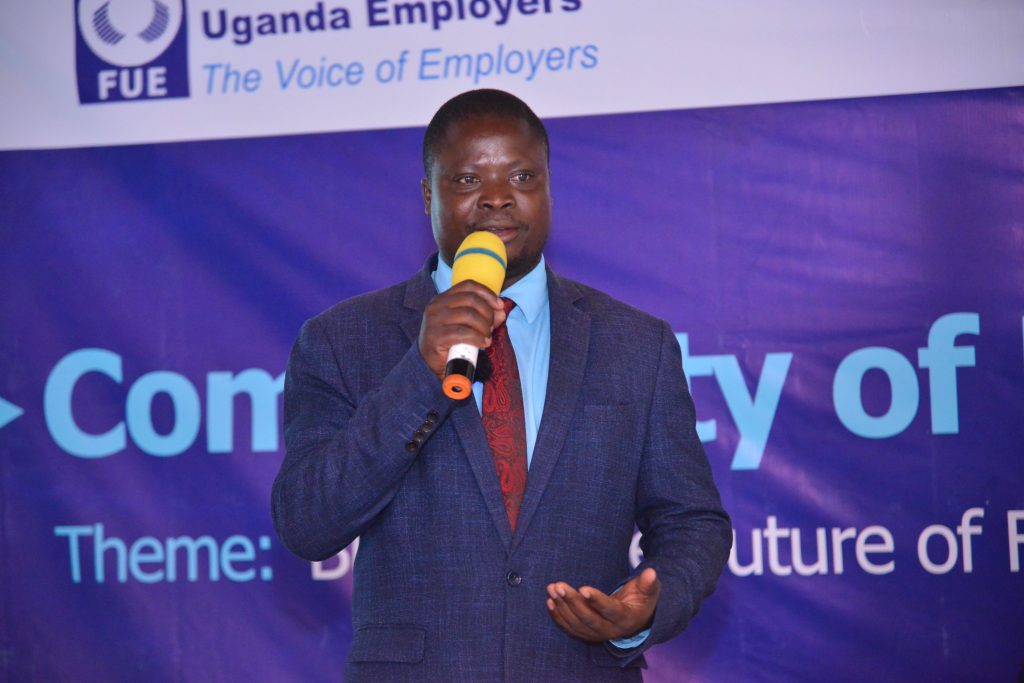
The Federation of Uganda Employers has come up with a new culture, together with the International labor organization, of engaging stakeholders in establishing a digital platform called the Community of Practice (COP) aimed at identifying key challenges and coming up with the resolutions towards improvement of the digital economy in Uganda.
Tuesday in Kampala, during the Inaugural ceremony, themed, “Building a Future of Fair and Inclusive Digital Work in Uganda”, Mr. Dan Okanya, Head of Policy and Research, Federation Uganda Employers addressed the purpose of the gathering as to creating a community of practice to understand and promote decent work practices in the digital economy.
He said that they realised the impact of COVID-19 on remote working and found out the need to address inequities in the digital economy. The community will also include various stakeholders such as government ministries, departments, agencies, private sector companies, and workers.
He, however, mentioned that the community will focus on discussing issues affecting the digital economy, including decent work practices and worker rights. The Legal frameworks supporting online work and protecting workers will be examined as well, with a focus on cybersecurity and data protection.
Promoting collaboration and sharing of best practices is another focus area, especially for rural areas. Therefore the community is funded by the Kingdom of Netherlands through the Prospects Project, with key partners and stakeholders involved, said Okanya.
While commenting on the key Stakeholders and Multi-Stakeholder engagement, he noted that the community will have a core team consisting of government agencies, private sector players, and workers. The Government agencies like the Uganda Communications Commission and ICT related bodies will be involved, in addition to private sector players, including startups and entrepreneurs also will provide perspectives on the digital economy. Workers will therefore provide insights into their needs and challenges, contributing to the community’s recommendations.
The COP will seek government support for its recommendations to address identified issues, connectivity and data protection are highlighted as critical issues for digitalization. Harmonization of policies, such as tax reductions and exemptions, is necessary to support digital skills development and therefore, the community aims to identify key challenges and come up with recommendations to improve the digital economy in Uganda, Onkanya included.
Daniel Emorut, International Labor Organization National Consultant described the concept of decent work as fair pay, health insurance, and labor law protection.
He said Traditionally 9 to 5 jobs are contrasted with modern online work, highlighting the shift towards remote work post-COVID. Examples of online platforms like Jumia and Safe boda are good to illustrate the invisible workforce in the digital economy.
The need for these workers to be protected by labor laws and to enjoy benefits like health insurance is crucial, adding that the Community of Practice aims to bring together government, private sector, and civil society to address these issues, he explained.
Emorut also highlighted the importance of the internet in the digital economy, mentioning platforms like Jumia and agent banking. Infrastructure challenges, including affordability and reliability of internet access. Gender and inclusion issues are addressed, with a focus on the lack of opportunities for persons with disabilities and those in rural areas.
The importance of these discussions in ensuring that all individuals have the same opportunities is emphasized with the necessity of adapting to the fast paced changes in the digital economy to avoid being left behind, Emorut noted.
